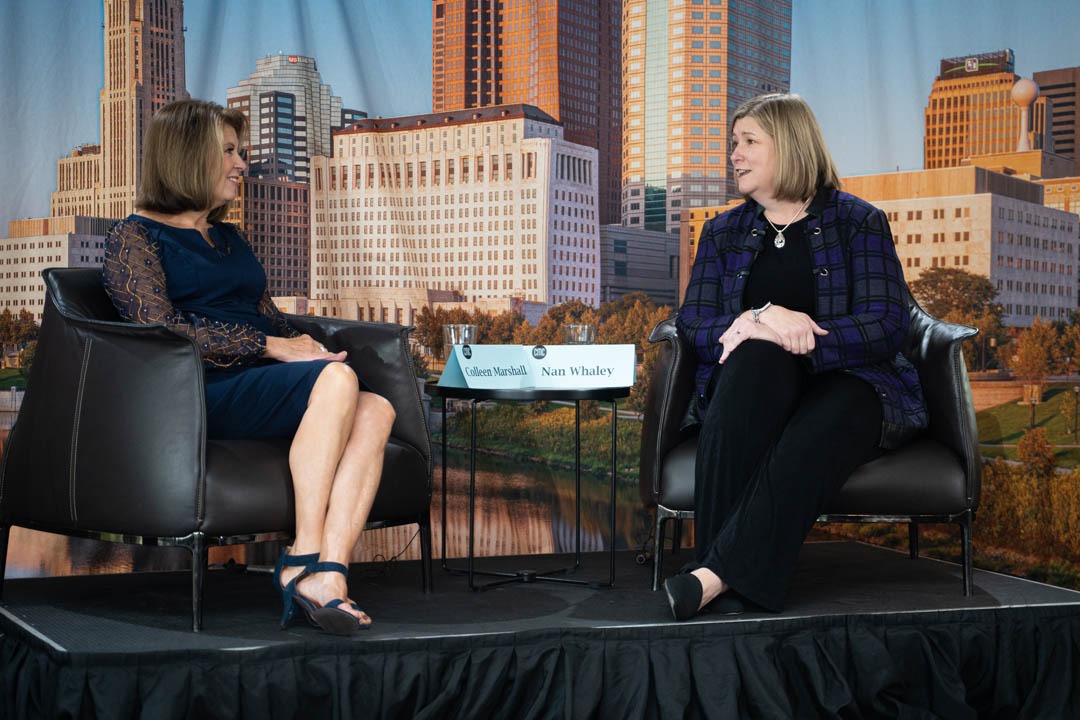Article by Tim Feran
Trying to get candidates for public office to sit down with their opponents in 2022 is easier said than done.
The Columbus Metropolitan Club billed its October 19 forum as “Meet the Candidates for Ohio Governor.” But only one candidate showed up: Democrat Nan Whaley. While an invitation was extended to Gov. Mike DeWine, his campaign declined to respond.
“We had a lot of discussions about an ‘open chair’ debate,” said Colleen Marshall, WCMH-TV anchor and moderator of the discussion. But rather than cancel the forum entirely, both Marshall and the CMC believed that bringing at least one candidate to the stage would allow the public to “go beyond canned messages” and have the candidate answer unscripted questions.
Ultimately, while DeWine was not physically present, he was very much the object of discussion during the forum.
Again and again, Whaley blasted DeWine for being “too weak” to stand up to “an illegitimate statehouse.” While Ohio is “a common-sense, middle-of-the road state, it’s governed by an extremist Statehouse,” due to gerrymandering, she said.
If that is the case, Marshall said, why do the few polls available show DeWine far ahead of Whaley?
“He’s been on the ballot since I was 10 months old,” said the 46-year-old former mayor of Dayton. “The guy has a lot of name recognition.” She added another possibility: The polls “consistently have not shown how big an issue abortion is. It’s going to make a difference in this race.”
A study in The New York Times found a 6.4 percent increase in voter registration by Ohio women in the wake of the Supreme Court’s decision to overturn Roe v. Wade. This gives Ohio the second highest registration increase by women in the country, behind Kansas. In that state, voters chose by an overwhelming margin to keep abortion legal.
“We think it is THE issue,” Whaley said.
Whaley also flayed DeWine over the continuing FirstEnergy bribery scandal, noting at one point, “FirstEnergy bankrolled DeWine’s campaign and he gave them everything they wanted.”
Whaley pledged that, as governor, she would sit on the redistricting commission and help create fair districts. Even so, “I still think (the legislature) will be majority Republican.
In an attempt to balance the discussion, Marshall asked Whaley to respond to commercials attacking the Democrat as “a failed mayor” who raised taxes and cut city services.
“My mother takes great offense to that” characterization as a failure, Whaley said, chuckling.
Referring to the tax, Whaley noted that it was a city income tax levy approved by voters in 2016 that made preschool affordable for every 4-year-old in Dayton. The program “has become a national best practice,” she said, and reiterated an early campaign promise that, if elected governor, she would take the plan statewide.
As far as service cuts, they happened in 2009 in the midst of the Great Recession, a “tough year for Dayton,” in which the city lost large General Motors and Delphi plants along with NCR, long a corporate jewel for the area.
Having lost thousands of jobs from those three body blows, “we did cuts so the city wouldn’t go bankrupt,” she said.
A topic of particular interest to Whaley were the actions that DeWine pledged to take after the mass shooting in Dayton in 2019, when a gunman killed nine people and injured 27 more. DeWine told Whaley that he would do something about gun control, she said.
Instead, DeWine signed laws that loosened regulations around firearms.
“I watched him do nothing,” she said. “Permitless carry was NOT veto-proof. He chose not to veto it.”
That would be far different from how Whaley would govern. If elected, she said that given the current makeup of the state legislature, “it will probably mean I will veto a lot of bills. I’m not going to go along just to go along. I really don’t think I’ll have a good relationship with this illegitimate Statehouse.”

